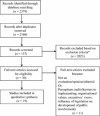What is the evidence base for public involvement in health-care policy?: results of a systematic scoping review
- PMID: 23252574
- PMCID: PMC5060770
- DOI: 10.1111/hex.12038
What is the evidence base for public involvement in health-care policy?: results of a systematic scoping review
Abstract
Background: Public involvement in health-care policy has been advocated as a means to enhance health system responsiveness, yet evidence for its impact has been difficult to ascertain.
Objectives: To review the peer-reviewed empirical evidence on outcomes of public involvement in health-care policy.
Methods: We systematically searched PsychINFO and PubMed from November 2000 to April 2010 for empirical studies that reported on original research only; studies in languages other than English, German or French were excluded. Data were extracted using a standardized evidence table with a priori determined headings.
Main results: Nineteen studies were identified as eligible for inclusion in our review. We found that sound empirical evidence of the outcomes of public involvement activities in health care remains underdeveloped. The concept and the indicators used to examine and determine outcomes remain poorly specified and inconsistent, as does the reporting of the evidence. There was some evidence for the developmental role of public involvement, such as enhancing awareness, understanding and competencies among lay participants. Evidence for instrumental benefits of public involvement initiatives was less well documented.
Conclusions: Despite the growing body of work on public involvement in health-care policy, evidence of its impact remains scarce; thus, firm conclusions about involvement activities that are appropriate and effective for policy development are difficult to draw. However, focus on outcomes risks missing the normative argument that involving the public in the health-care policy process may be seen to be of intrinsic value.
Keywords: decision making; health policy; impact; outcomes; priority-setting; public involvement; review.
© 2012 John Wiley & Sons Ltd.
Figures

References
-
- Wait S, Nolte E. Public involvement policies in health: exploring their conceptual basis. Health Economics, Policy and Law, 2006; 1: 149–162. - PubMed
-
- Conklin A, Morris Z, Nolte E. Involving the public in healthcare policy: an update of the research evidence and proposed evaluation framework. Cambridge: RAND Europe, 2010.
-
- Coulter A. The autonomous patient: ending paternalism in medical care. London: The Nuffield Trust, 2002.
Publication types
MeSH terms
LinkOut - more resources
Full Text Sources
Miscellaneous

